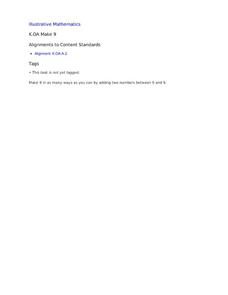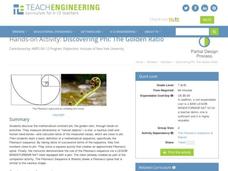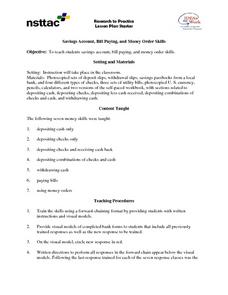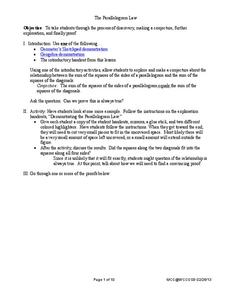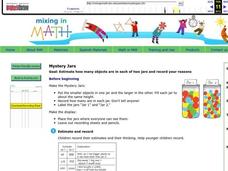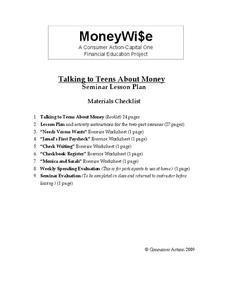Curated OER
M&M Math
Students research number values by participating in a candy exercise. In this math function lesson, students utilize baking ingredients to create cookies and multiply how many M&M's will go into the batch if you want a certain amount...
Curated OER
M&M Math
Students plan and make the M&M cookies, tally M&M's by color while eating cookie, and completing worksheet using math skills.
Illustrative Mathematics
Make 9
Learning how numbers are put together as parts and wholes is a big step in building the foundational number sense of young mathematicians. Here, children are given a number less than 10 and are asked to find as many pairs of numbers as...
Teach Engineering
Discovering Phi: The Golden Ratio
Fe, phi, fo, fum. This activity leads pairs to find the ratio of consecutive terms of the Fibonacci sequence. The pairs find that the Fibonacci sequence can be found in many places. A discussion with the class shows that the ratios...
Curated OER
Savings Account, Bill Paying, and Money Order Skills
What do you do after you get a paycheck? Help your mildly disabled learners how to bank wisely with a guided-skills activity. They practice cashing checks, withdrawing money, paying bills, and procuring money orders. The entire learning...
PBS
The Yo-Yo Problem
What do yo-yos and pennies have to do with linear equations? Learn about writing and solving linear equations while considering the Yo-Yo Problem and Penny Pattern Exploration from the High School Math Project. Learners utilize algebra...
West Contra Costa Unified School District
The Parallelogram Law
Use your pupils' sense of curiosity to explore the Parallelogram Law. Here is an activity that outlines a complete lesson plan from beginning to end, allowing pupils to follow a conjecture through to the proof stage.
Lesson This!
Math Lesson Plan: Halloween Candy Counting
Post-Halloween learners bring in candy treats to use for counting practice. They estimate how full a bowl of candy will get when there are 100 and 200 pieces of candy counted and put in it. They take turns counting to 100 and 200;...
Math Solutions
Shape Sorting: Looking for Green!
Young mathematicians rotate, flip, and sort their way to an understanding of the different attributes of geometric figures. Using transparent yellow and blue shapes, children try to match congruent figures together...
Curated OER
Global Warming
A series of independent learning activities teaches learners about global warming as it relates to economics and industrialization. The culminating project requires them to create a multimedia presentation identifying the problems,...
Curated OER
Goldfish Addition and Subtraction
Engage in a hands-on addition and subtraction activity that is a wonderful tie-in with ocean studies. As the teacher, you will make up equations using construction paper and goldfish crackers.
Howard County Schools
Drawing Inverses
An Algebra II lesson draws the connection between the exponential function and its inverse. By graphing an exponential function and using tables and a calculator, young scholars graph the logarithmic function. The plan comes with a...
Curated OER
Mystery Jars
This is a twist on the old "guess how many jellybeans" game. Using estimation and math skills, learners participate in a fun "mystery jars" activity, trying to make educated guesses at how many objects are in two jars. The basic activity...
EngageNY
Similarity and the Angle Bisector Theorem
Identifying and verifying reproducible patterns in mathematics is an essential skill. Mathematicians identify the relationship of sides when an angle is bisected in a triangle. Once the pupils determine the relationship, they prove it to...
Teach Engineering
Discovering Relationships Between Side Length and Area
Consider the relationship between side length and area as an input-output function. Scholars create input-output tables for the area of squares to determine an equation in the first installment of a three-part unit. Ditto for the area of...
Alabama Learning Exchange
Imaginary Numbers? What Do You Mean Imaginary?
Don't worry, this resource actually exists. Scholars learn about imaginary numbers and work on problems simplifying square roots of negative numbers. As an extension, they research the history of imaginary numbers.
Consumer Action
Talking to Teens About Money
Your teenagers are probably very good at spending money, but how good are they at managing it? Teach class members about banking, checking accounts, interest rates, car insurance, and many other relevant concepts with a series of...
Futures Channel
Algebra Magic
Abracadabra! Letters can be used in math to represent numbers with the operations of addition, subtraction, multiplication, and division to solve problems! Math magicians will participate in an activity that uses a calculator and a bag...
EngageNY
Experiments with Inscribed Angles
Right angles, acute angles, obtuse angles, central angles, inscribed angles: how many types of angles are there? Learners first investigate definitions of inscribed angles, central angles, and intercepted arcs. The majority of the...
EngageNY
Differences Due to Random Assignment Alone
It takes a lot of planning to achieve a random result! Learners compare results of random assignment, and conclude that random assignment allows results to be attributed to chance. They also realize the set of random means...
EngageNY
Solving for Unknown Angles Using Equations III
Challenge your classes to combine geometric and algebraic concepts with an activity that builds on concepts learned in the first three lessons of the series. The fourth part asks scholars to identify geometric angle relationships and use...
EngageNY
Multi-Step Ratio Problems
Use ratios to solve problems that are not proportions. The instructional activity has pupils solve multi-step ratio problems that involve fractional increases and decreases. The problems involve mark-ups, discounts, commissions, and...
EngageNY
Identifying Proportional and Non-Proportional Relationships in Graphs
Graph a relationship to find out if it is proportional. The instructional activity introduces the criteria for determining whether a relationship is a proportional relationship based on its graph. Pupils graph relationships and determine...
Polar Trec
Down to the Deep Virtual Lab
At a depth of 3,000 m in the ocean, the pressure is 300 times that at sea level! In the activity, individuals predict what will happen to Styrofoam cups submerged 3,000 meters into the ocean. They then convert these units to soccer...
Other popular searches
- Outdoor Math Activities
- Dinosaurs Math Activities
- Hands on Math Activities
- Holiday Math Activities
- Valentine Math Activities
- Halloween Math Activities
- Consumer Math Activities
- 100th Day Math Activities
- Pumpkin Math Activities
- Base Ten Math Activities
- Christmas Math Activities
- Money Math Activities


